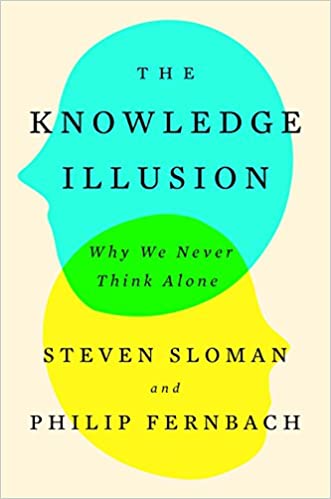

The Knowledge Illusion: Why We Never Think Alone, by Steven Sloman and Philip Fernbach (click image to see publisher’s description)
People no doubt make errors in judgments. At the same time, we know people are capable of remarkable intellectual achievements. The tension between the two might prompt us to ask a legitimate question: “If people are so demonstrably dumb, how did we get to the moon?” The Knowledge Illusion, by scholars Steven Sloman and Philip Fernbach, suggests one answer to this important question.
The Knowledge Illusion explores two key ideas. The first is that we all overestimate our knowledge. The second is that the knowledge that we access in making decisions does not just reside in our heads but also outside our heads — in our bodies, our environment, and other people in the communities in which we live and participate. Moreover, we are typically unaware of the sources of the knowledge that shape our decisions.
Sloman and Fernbach write well for a general audience, and their explanations of many phenomena were a pleasure to read. The early chapters of the book convincingly explicate their thesis about the chronic overestimation of knowledge and the reliance on “external” sources of information. “Because we confuse the knowledge in our heads with the knowledge we have access to,” they say, “we are largely unaware of how little we understand. We live with the belief that we understand more than we do.” They go on to posit that “many of society’s most pressing problems stem from this illusion.”
The Knowledge Illusion: Why We Never Think Alone
book by Steven Sloman & Philip Fernbach
published by Riverhead Books (March 14, 2017)
Available on Amazon and Kindle